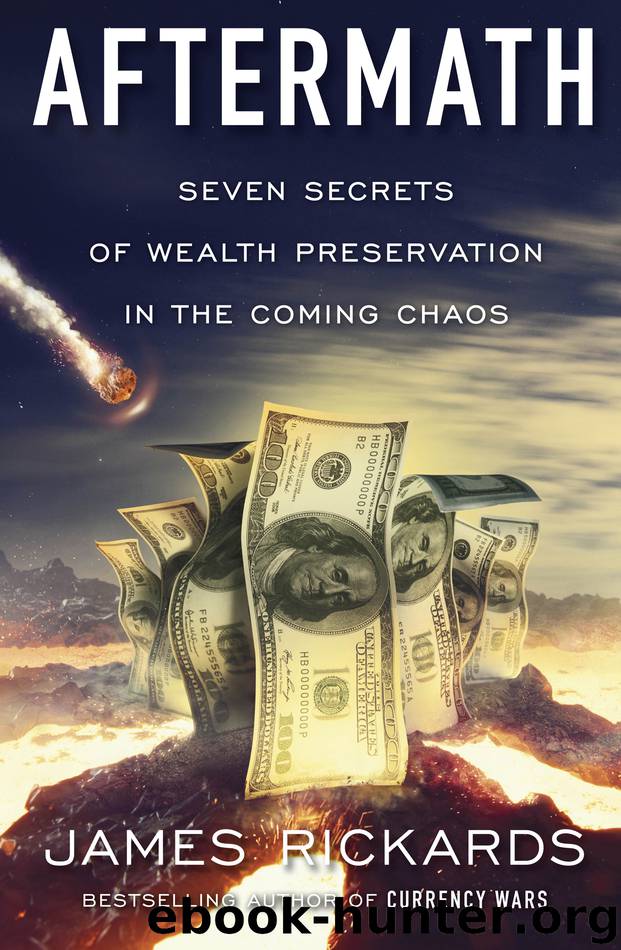Aftermath by James Rickards

Author:James Rickards
Language: eng
Format: epub
ISBN: 9780241980798
Publisher: Penguin Books Ltd
Published: 2019-07-22T16:00:00+00:00
According to Kelton, your money is like the coat-check ticket because the state says so.
From this reasoning, Kelton and her ilk expand in all directions. If money is what the state says it is, then anything can be money, including gold. Prior to the late twentieth-century, most state money was gold. Kelton claims gold was money not because of scarcity or utility, but because the state proclaimed it money as a matter of custom more than necessity. Once paper became the object of the proclamation, paper became money and gold fell by the wayside. Today, the proclamation covers digital dollars, which serve just as well as paper or gold.
Kelton also explains the double-entry accounting behind chartal money. Such money is always an asset and a liability at the same time. A dollar is a liability of the central bank that creates it and an asset of the citizen who holds it. Once a tax obligation arises, that is a liability of the citizen and an asset of the state. The citizen tenders his asset (the dollar) to extinguish his liability (the tax bill). From the state’s perspective, both the liability and the asset are extinguished together when the taxes are paid. As Kelton explains, “the state actually accepts only its own liabilities in payment to itself.”17 This may conjure up an image of a snake swallowing its tail, but it’s really a simple accounting exercise.
Kelton makes two other points in laying the foundation for MMT. The first is that debt and credit are the same viewed from different perspectives. If the state issues dollars as transfers to citizens, the state is the debtor because dollars are central bank liabilities, and citizens are creditors because they accept and hold the debt. For MMT, money is debt. This is not true if the state proclaims gold to be money, because gold has commodity value independent of the state, but Kelton glosses over this since gold is not proclaimed to be money today.
This conceptual money-equals-debt identity allows Kelton to create what she calls the “hierarchy of money.” This is an ontology of money-debt ranked in descending order of acceptability based on liquidity and convertibility of one form to another. At the top of the pyramid are central bank dollars and Treasury bonds, because these are issued by the state. Next come bank deposits, because these are practically indistinguishable from central bank dollars due to the banks’ license to create credits to citizen accounts. At the bottom of the pyramid come corporate debt and household debt. While these debts are denominated in dollars, they are not equivalent to bank liabilities due to credit risk and illiquidity. The importance of this ontology is that it demonstrates, at least to the satisfaction of the MMT gang, that the concept of money is highly elastic. Literally anyone can create money in some form by issuing an IOU. It’s as if the Federal Reserve expanded its definitions of money supply from M0, M1, and M2, to include M4, M5, M6, and so on.
Download
This site does not store any files on its server. We only index and link to content provided by other sites. Please contact the content providers to delete copyright contents if any and email us, we'll remove relevant links or contents immediately.
International Integration of the Brazilian Economy by Elias C. Grivoyannis(111059)
The Radium Girls by Kate Moore(12028)
Turbulence by E. J. Noyes(8049)
Nudge - Improving Decisions about Health, Wealth, and Happiness by Thaler Sunstein(7706)
The Black Swan by Nassim Nicholas Taleb(7129)
Rich Dad Poor Dad by Robert T. Kiyosaki(6632)
Pioneering Portfolio Management by David F. Swensen(6300)
Man-made Catastrophes and Risk Information Concealment by Dmitry Chernov & Didier Sornette(6019)
Zero to One by Peter Thiel(5801)
Secrecy World by Jake Bernstein(4753)
Millionaire: The Philanderer, Gambler, and Duelist Who Invented Modern Finance by Janet Gleeson(4478)
The Age of Surveillance Capitalism by Shoshana Zuboff(4292)
Skin in the Game by Nassim Nicholas Taleb(4248)
The Money Culture by Michael Lewis(4207)
Bullshit Jobs by David Graeber(4190)
Skin in the Game: Hidden Asymmetries in Daily Life by Nassim Nicholas Taleb(4006)
The Dhandho Investor by Mohnish Pabrai(3764)
The Wisdom of Finance by Mihir Desai(3746)
Blockchain Basics by Daniel Drescher(3582)
